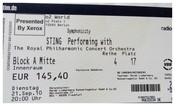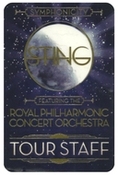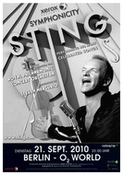
An Englishman in the multi-purpose hall...
Sting, eternal pop hero and British do-gooder, performs "with his most famous songs" and orchestral accompaniment at Berlin's O2 World.
The maestro can no longer stand on his maestro feet. He wobbles, bounces in his knees, hops as if being dribbled from above, now in one direction, now in the other. He flings his arms around, controlling an invisible theremin. The maestro's name is Steven Mercurio, and he's currently conducting the Royal Philharmonic Concert Orchestra from London, with the program "Symphonicity": Sting, eternal pop hero and British do-gooder with the Commander's Cross (two steps below the order of knighthood, but still quite elegant), performs "with his most famous songs" and orchestral accompaniment at Berlin's O2 World. And that's where the trouble begins: Unfortunately, the large arena doesn't offer exactly what classical music actually needs—a beautiful soundstage. The O2 World itself doesn't sound like anything; it's not allowed to sound like anything because it's a multi-purpose arena, and thus has to provide the right acoustic environment for Shakira, the Eisbären, and Kiss in turn.
So, when a large classical orchestra plays there, with instruments whose volume and tonal differences would normally be accommodated by advantageous and sensitive positioning in the room, it has to rely exclusively on technology. Everything has to be amplified, and somehow, in the end, everything is equally loud: the brass, the woodwind, the numerous strings, the accompanying band with guitar and bass, the background singer, the two percussionists. Euphemistically speaking, everyone can be heard clearly, and the seated audience appreciates this, joining in from the first bar of 'If I Ever Lose My Faith In You' and already enthusiastically returning the 'eee-aaw-ooh' that Sting, ever the nonchalant crowd-pleaser, demands by the second song, 'Every Little Thing She Does Is Magic.' You still can't call it a party, but then again, this isn't the same youthful, boisterous post-punk crowd that it once was when The Police released 'Outlandos D'Amour', and anyone under 40 that evening, as it quickly becomes clear during the long break between sets while getting a beer, works here.
The astonishing thing is that in many songs, after a beginning that is usually extremely furiously arranged and packed with self-confident pathos, you hardly hear much of the large, firm instrumentation: 'An Englishman in New York' already featured plenty of plucking strings and the notorious soprano saxophone in the original, as does 'Moon Over Bourbon Street'. And 'Roxanne,' which Sting simply intones calmly and measuredly an octave lower instead of in his nasty, familiar head voice, isn't made any worse by the orchestra, but it's also no better. Between the pieces, Sting tells little stories, and one is really interesting: He always writes the music first and then the lyrics of a song, because the music itself has narrative structures and essentially channels what it's about to him.
At one point, he tells the shyly giggling audience that his subconscious wanted him to write about "a male transsexual prostitute." Sting giggles along a bit, then sets an example of his tolerance. Although he initially wanted to leave the song alone after this realization, his subconscious wouldn't give him peace: "You write about heterosexuality too, why not about a transsexual?" And so "Tomorrow We'll See" came about. But apart from the fact that transgender has nothing to do with sexual orientation, the music is telling. The lyrics, with their countless clichés of wet streets, short skirts, and generous punters, actually reflect the music.
Maybe that's exactly his trick. Sting, at least since he went solo, makes it so damn easy. When he sings about Russians, he collages a piece of Prokofiev; when he sings about New York, the saxophone has to get involved; when easy girls come around the corner, the sound gets groovy. But the well-filled, if not sold-out, hall likes it. For minutes, in some rows, even with their eyes closed, they chant "Be yourself, no matter what they say," which is strikingly reminiscent of Monty Python's great dialogue in "Life of Brian": "You are all individuals!" - "We are all individuals!" After the Irish interludes in "This Cowboy Song," there are standing ovations, and in the end, the symphonic pop philistine has inspired everyone who wanted to be inspired. What the heck, after all, he's never hurt anyone.
(c) Der Tagesspiegel by Jenni Zylka
09212010
SET LIST
- If I Ever Lose My Faith In You
- Every Little Thing She Does Is Magic
- Englishman In New York
- Roxanne
- Straight To My Heart
- When We Dance
- Russians
- I Hung My Head
- Shape Of My Heart
- Why Should I Cry For You?
- Whenever I Say Your Name
- Fields Of Gold
- Next To You
- A Thousand Years
- This Cowboy Song
- Tomorrow We'll See
- End Of The Game
- You Will Be My Ain True Love
- All Would Envy
- Mad About You
- King Of Pain
- Every Breath You Take
- Desert Rose
- She's Too Good For Me
- Fragile
- I Was Brought To My Senses






